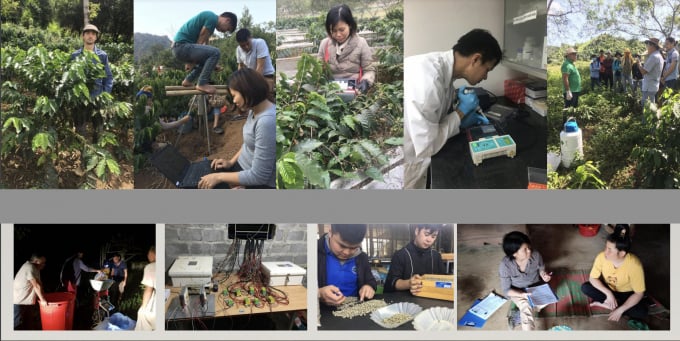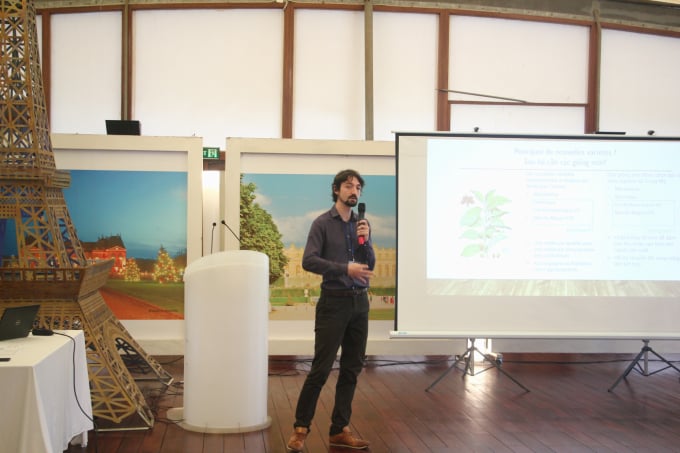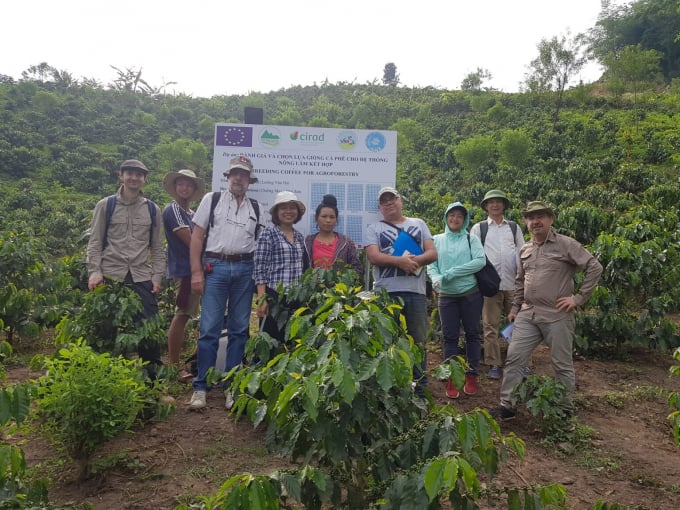May 29, 2025 | 19:40 GMT +7
May 29, 2025 | 19:40 GMT +7
Hotline: 0913.378.918
May 29, 2025 | 19:40 GMT +7
Hotline: 0913.378.918
At a recent seminar hosted by the French Agricultural Research Centre for International Development (CIRAD) to announce the results of experimental cultivation of hybrid arabica coffee varieties in the region's northwest, agricultural experts highlighted the yield, quality, and climate change-resilience advantages of hybrid F1 varieties.

Data collection and research on hybrid arabica varieties in the field and in the laboratory. Photo: CIRAD.
Vietnam is the second-largest coffee producer in the world, with 95 percent of its output being robusta. Despite possessing favorable traits like resilience to pests and diseases, climate change- resilience, and high yield, arabica is not Vietnam's forte.
In the province of Son La, more than 3,000 hectares of coffee crop were destroyed in December 2019 due to extreme cold. According to experts, by 2025, around 20,000 hectares of coffee area in the Northwest would need replanting.
According to Pierre Marraccini, a researcher of CIRAD, current coffee varieties are less likely to be compatible with climate change in the upcoming years.
This provided the motivation for CIRAD, ECOM Corporation - one of the world's largest coffee units - and Vietnamese institutes to collaborate in the testing of hybrid F1 arabica selected from Central America for planting in Vietnam.
Since 2017, the project "BREEDing Coffee for Agroforestry Systems" (BREEDCAFS) has been implemented in the provinces of Son La and Dien Bien in order to breed and test new F1 coffee varieties with high yield and high quality in order to increase income for coffee producers in the Northwest and assist farmers in adopting agroforestry farming practices.
According to CIRAD expert Clement Rigal, this is an essential objective for Vietnam in light of climate change, which causes extreme weather that has a direct impact on coffee production. Mr. Rigal stated, "We have selected and developed four F1 coffee varieties that meet the yield requirements and are appropriate for the microclimate at the test sites."

CIRAD Clément Rigal expert announced the results of testing F1 hybrid coffee in Vietnam after 5 years. Photo: Linh Linh.
The experimental results demonstrated that F1hybrid arabica varieties, namely Starmaya, Marsellesa, Centroamericano H1, and Mundo Maya H16, cultivated in microclimates ranging from hot and rainy to moderate temperature and low rainfall and cold and rainy generated high yields
"The good news is that we have determined whether hybrids are suited for local conditions. The results indicate that the cultivars are suited to the climatic conditions of the Northwest and that the higher the altitude, the better the tree develops and the larger the production, indicating the future potential of these types", Mr. Rigal said.
In terms of coffee bean quality, although the original Catimor variety has a high proportion of flat and imperfect seeds, hybrids, particularly Centroamericano H1, generate larger coffee beans with better quality.
"The high yield level, which is 10 to 15 percent greater than the typical yield in the region, coupled with a better taste quality would assure a more worthwhile revenue for the producer," stated the CIRAD expert.
The introduction and testing of these new varieties were initially sponsored by the European Union via the BREEDCAFS project from 2017 to 2022, and subsequently by the European Union and AFD via the ASSET project beginning in 2021 to 2024.
The experimental results also indicate that coffee and tea cultivation based on the agroforestry concept is a positive development. By taking advantage of the annual shade, optimal growth conditions are produced for coffee seedlings. In addition, this intercropping approach provides a number of other benefits, including the enhancement of soil fertility, the regulation of microclimate, and the promotion of carbon sequestration.
According to experts, this strategy is consistent with Vietnam's agricultural development policy in order to preserve land usage area, diversify crops, generate additional revenue sources, and offer employment opportunities for people.
According to a CIRAD researcher, the approach also has some disadvantages, including growing competition between coffee trees and perennials and the coverage of shade from perennial trees, resulting in a decrease in coffee yield. Consequently, arabica varieties are also produced to respond to this intercropping circumstance.

The project "BREEDing Coffee for Agroforestry Systems" (BREEDCAFS) started in 2017.
Experts raised questions at the seminar regarding the advantages and quality of arabica grown using the agroforestry model. The expert from CIRAD stated that the project has examined the production culture and national agricultural development plan in Vietnam in order to breed and produce new arabica varieties.
The results of five years of the study indicate that coffee trees grow well and generate a good yield at high altitudes and that this is equally true for plants cultivated at modest heights but in the shadow of perennial trees. Additionally, the harvest period of the new cultivars is one to one and a half months longer than that of the Catimor variety (32 weeks).
According to Luu Ngoc Quyen, the director of the Northern Mountainous Agro-Forestry Science Institute (NOMAFSI), the ripening time of hybrid coffee is very concentrated, the percentage of green fruit is low, and the late harvest time helps the tree accumulate better nutrients, resulting in a higher quality arabica.
According to experts, agroforestry is also a solution to the current deforestation issue. New hybrid coffee varieties with high yields and good product quality leading to better selling prices, therefore helping to enhance farmers' incomes, will serve as the foundation for pushing people to switch to ecological agriculture and prevent destroying forest resources.
Translated by Linh Linh
/2025/05/25/4127-3-073637_820.jpg)
(VAN) Thanks to the promotion from an FAO-implemented project, vegetable production in greenhouses in Moc Chau has seen strong development, from 1.5 hectares in 2021 to nearly 50 hectares in 2024.

(VAN) FAO has recently supported USD 140,000 to implement the project 'Risk mitigation human-animal interface risks through disease control initiatives in pig farming.'

(VAN) The People's Committee of Tra Vinh province has approved an adjustment to the investment policy for the Green Hydrogen Plant project, increasing its area to approximately 52.76 hectares.
![Reducing emissions from rice fields: [2] Farmers’ commitment to the soil](https://t.ex-cdn.com/nongnghiepmoitruong.vn/608w/files/news/2025/05/05/dsc08881jpg-nongnghiep-140632.jpg)
(VAN) Clean rice cultivation model in Thuong Tan commune, Bac Tan Uyen district, is assisting local residents in achieving sustainable agriculture by substantially reducing costs, increasing productivity, and protecting the environment.

(VAN) At the conference to disseminate Resolution No. 68, AgriS introduced its digital agricultural ecosystem and reaffirmed its commitment to accompanying the Government in promoting private sector development and sustainable agriculture.

(VAN) 'Blue Ocean - Blue Foods' initiative is designed to restore marine ecosystems and establish sustainable livelihoods for local communities by cultivating a minimum of 1,000 hectares of cottonii seaweed in the first three years.
/2025/05/21/4642-3-112707_603.jpg)
(VAN) The V-SCOPE project has made direct contributions to three out of six pillars of the Comprehensive Strategic Partnership between Vietnam and Australia.